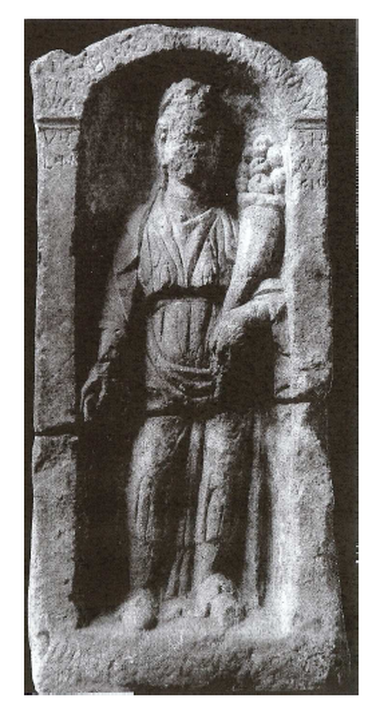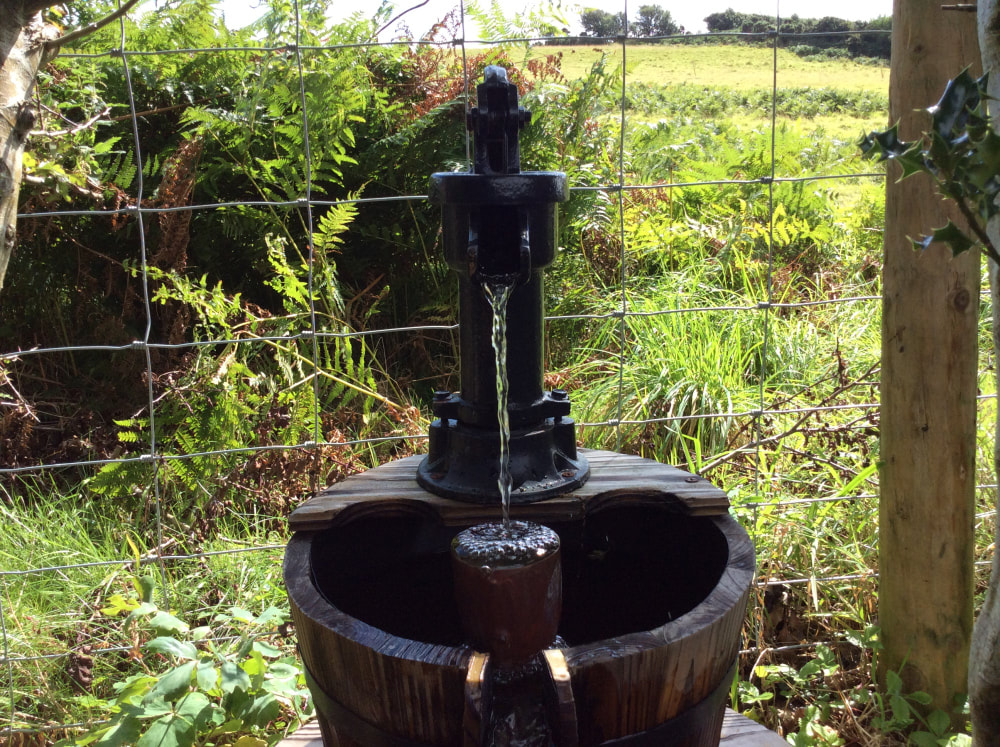Brython
Rosmerta
Rosmerta: the 'Great Provider' (or quite possible 'great Prophetess'), she is a mainly a continental Goddess who was most often associated with the Mercury (or Lugus to our interest). She is strongly associated with seer-ship, fate and sovereignty. There are indications she was also associated with a cult of the dead.
A Hymn to Rosmerta
|
A Hymn to Rosmerta
|
Rosmerta
by Greg
|
You bring to us
The Cup of Plenty For the Harvest The Vat , the Dish The Mixing Bowl The Vessel from the Well Shaft Drawing sweet water from the Earth Bringing for us the Waters of Life Bringing before us the Mirror Pool of Vision So you are named ROSMERTA The Great Provider The Far Seer Whose Shining Cup annoints Shaping the Ways of the World Bestowing Plenty, the Wealth we hold In common, Sovereignty claimed But gained only with your Blessing: Bless us who would hold the Earth for you Bless us when we challenge those Who seek to hold it without Love. |
Notes and Resonances
I
We need a modern version of Sovereignty and how we relate to a Goddess of Sovereignty in our times when power is held without such validation.
II
Michael Enright traces the office of Cup-Bearer in early Germanic and Celtic societies back to Rosmerta with her Cup, Ladle and Bucket. See: Lady With a Mead Cup (Four Courts Press,1996). He also links the role of Cup-Bearer with that of Prophetess and in particular with the Seer Veleda, referred to by Tacitus in Germania.
III
John Carey examines the role of Sovereignty as a young woman and Cup-Bearer associated with Lug in the early Irish tale Baile in Scáil in Ireland and the Grail (Celtic Studies Publications, 2007) and also identifies possible links with Rosmerta, as does Proinsias MacCana in Celtic Mythology (Hamlyn, 1968).
IV
In a discussion by Rachel Bromwich of the drowning of the lands of Gwyddno Garanhir at Cantre’r Gwaelod as described in a poem in The Black Book of Carmarthen, and the role of Mererid as ‘Maiden’ and ‘Fountain Cup-Bearer’ , the context of the office of ‘Machteith’ (‘Maiden’) in Welsh courts is identified. See The Early Cultures of North-WestEurope ed. C Fox & B Dickens ( Cambridge, 1950). Mererid, as represented in this poem, appears to be of a type with the well maidens whose violation causes flooding from the well and is a source of several legends in Ireland and Wales explaining the origins of lakes .
V
There is an echo of this maiden role in the fourth of the four Mabinogi tales where Mathfab Mathonwy has a ‘maiden foot-holder’ called Goewin who later becomes his wife after being raped by his nephew. In a recent post I suggested that it might be useful to regard both Gwydion and Lleu in that tale as aspects of Lugus. Similarly we may regard Goewin and Aranrhod from the same tale as aspects of Rosmerta : the maiden function as expressed in later offices of Cup-Bearer and the fecundity function in Aranrhod‘s bearing of two children when she, herself, is asked to replace Goewin in this role. But there seem to be a reverse logic operating here. Lleu‘s sovereignty is not affirmed and rather than taking the Sovereignty Goddess for a wife, one is created for him out of flowers when Aranrhod refuses to recognise him. What is going on here?
First we should note that when gods appear in stories their relationships often get mixed up so that partners might appear as husband and wife, parent and child or other relation. Secondly that gods can give rise to a range of human figures when they appear in stories or later lore. Examining the appearances of the god Lugus in Irish stories Mark Williams comments in Ireland’s Immortals (Princeton, 2017) that there might have been “multiple Luguses” including the many heroes, ancestors and legendary kings who seem to be mortals ruling as his representative or alter ego. So Lleu can in this way be both subject to the Sovereignty Goddess as well as being (as Gwydion?) her associate. Is the refusal to recognise him here a continuing consequence of the rape of Goewin in the first part of the tale?
If violating her maiden role can be linked to an attempted subversion of Sovereignty by force, the shape-shifting of Lleu can be seen as a continuation of the shape-shifting imposed on Gwydion and Gilfaethwy as punishment for the rape. Lleu‘s battle with Gronw for the right to rule is the agency of his shift into the form of an eagle. But when he returns to kill Gronw it is Blodeuedd who is transformed into an owl.
John Carey, in an interesting article on this tale, regards it as a British Myth of Origins (Historyof Religions, Vol 31, 1991). He sees the virgin status of Goewin, and the fact that Math is unmarried, as indicating a timeless ‘Golden Age’ before mortality when the King simply put his feet in the lap of Sovereignty or stood on the Virgin Earth. With the coming of mortality – and therefore sex – the same female figure then becomes his wife. I’m not sure I go along with this as a myth of origins but I do agree that the transformation of Goewin’s maiden status is a crucial element in the thematic development of this story. The shift in her status from maiden to wife seems to me to be about a shift in the protocols for the right to rule. The one time when Math does not have to have his feet in Goewin’s lap is when he is defending his territory. When Lleu is absent from Blodeuedd his rule is challenged. The banishment of Blodeuedd when Lleu‘s rule is restored could be seen as an appropriation of power from the Sovereignty Goddess whose role seems to be distributed across the three female figures in this story.
VI
In Gaul, and later in Britain, the Romans paired Rosmerta with their own Mercury rather than Lugus. This seems to have been a process of assimilation following appropriation. There are many ways that sovereignty can be claimed, exercised or subverted. Understanding this may allow us to develop our own sense of how it is exercised, refused or acknowleged in our own time.
VII
In my own practice at my Water Shrine I acknowledge Mererid as Shrine Guardian and Holder of the Cup of Rosmerta.
I
We need a modern version of Sovereignty and how we relate to a Goddess of Sovereignty in our times when power is held without such validation.
II
Michael Enright traces the office of Cup-Bearer in early Germanic and Celtic societies back to Rosmerta with her Cup, Ladle and Bucket. See: Lady With a Mead Cup (Four Courts Press,1996). He also links the role of Cup-Bearer with that of Prophetess and in particular with the Seer Veleda, referred to by Tacitus in Germania.
III
John Carey examines the role of Sovereignty as a young woman and Cup-Bearer associated with Lug in the early Irish tale Baile in Scáil in Ireland and the Grail (Celtic Studies Publications, 2007) and also identifies possible links with Rosmerta, as does Proinsias MacCana in Celtic Mythology (Hamlyn, 1968).
IV
In a discussion by Rachel Bromwich of the drowning of the lands of Gwyddno Garanhir at Cantre’r Gwaelod as described in a poem in The Black Book of Carmarthen, and the role of Mererid as ‘Maiden’ and ‘Fountain Cup-Bearer’ , the context of the office of ‘Machteith’ (‘Maiden’) in Welsh courts is identified. See The Early Cultures of North-WestEurope ed. C Fox & B Dickens ( Cambridge, 1950). Mererid, as represented in this poem, appears to be of a type with the well maidens whose violation causes flooding from the well and is a source of several legends in Ireland and Wales explaining the origins of lakes .
V
There is an echo of this maiden role in the fourth of the four Mabinogi tales where Mathfab Mathonwy has a ‘maiden foot-holder’ called Goewin who later becomes his wife after being raped by his nephew. In a recent post I suggested that it might be useful to regard both Gwydion and Lleu in that tale as aspects of Lugus. Similarly we may regard Goewin and Aranrhod from the same tale as aspects of Rosmerta : the maiden function as expressed in later offices of Cup-Bearer and the fecundity function in Aranrhod‘s bearing of two children when she, herself, is asked to replace Goewin in this role. But there seem to be a reverse logic operating here. Lleu‘s sovereignty is not affirmed and rather than taking the Sovereignty Goddess for a wife, one is created for him out of flowers when Aranrhod refuses to recognise him. What is going on here?
First we should note that when gods appear in stories their relationships often get mixed up so that partners might appear as husband and wife, parent and child or other relation. Secondly that gods can give rise to a range of human figures when they appear in stories or later lore. Examining the appearances of the god Lugus in Irish stories Mark Williams comments in Ireland’s Immortals (Princeton, 2017) that there might have been “multiple Luguses” including the many heroes, ancestors and legendary kings who seem to be mortals ruling as his representative or alter ego. So Lleu can in this way be both subject to the Sovereignty Goddess as well as being (as Gwydion?) her associate. Is the refusal to recognise him here a continuing consequence of the rape of Goewin in the first part of the tale?
If violating her maiden role can be linked to an attempted subversion of Sovereignty by force, the shape-shifting of Lleu can be seen as a continuation of the shape-shifting imposed on Gwydion and Gilfaethwy as punishment for the rape. Lleu‘s battle with Gronw for the right to rule is the agency of his shift into the form of an eagle. But when he returns to kill Gronw it is Blodeuedd who is transformed into an owl.
John Carey, in an interesting article on this tale, regards it as a British Myth of Origins (Historyof Religions, Vol 31, 1991). He sees the virgin status of Goewin, and the fact that Math is unmarried, as indicating a timeless ‘Golden Age’ before mortality when the King simply put his feet in the lap of Sovereignty or stood on the Virgin Earth. With the coming of mortality – and therefore sex – the same female figure then becomes his wife. I’m not sure I go along with this as a myth of origins but I do agree that the transformation of Goewin’s maiden status is a crucial element in the thematic development of this story. The shift in her status from maiden to wife seems to me to be about a shift in the protocols for the right to rule. The one time when Math does not have to have his feet in Goewin’s lap is when he is defending his territory. When Lleu is absent from Blodeuedd his rule is challenged. The banishment of Blodeuedd when Lleu‘s rule is restored could be seen as an appropriation of power from the Sovereignty Goddess whose role seems to be distributed across the three female figures in this story.
VI
In Gaul, and later in Britain, the Romans paired Rosmerta with their own Mercury rather than Lugus. This seems to have been a process of assimilation following appropriation. There are many ways that sovereignty can be claimed, exercised or subverted. Understanding this may allow us to develop our own sense of how it is exercised, refused or acknowleged in our own time.
VII
In my own practice at my Water Shrine I acknowledge Mererid as Shrine Guardian and Holder of the Cup of Rosmerta.
Proudly powered by Weebly

